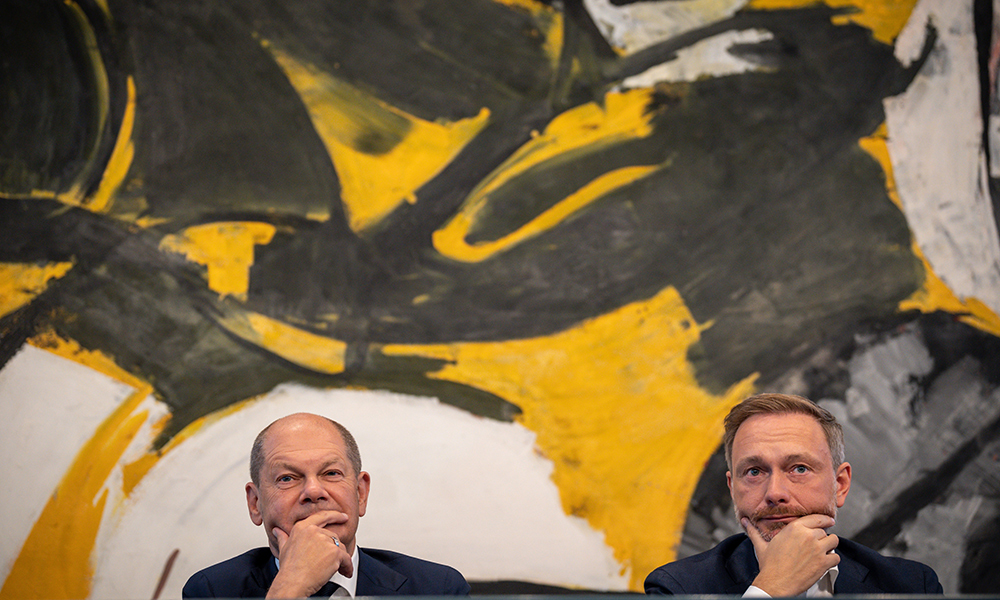
面对快速恶化的能源危机,欧洲正在试图找到解决方案。这场能源危机可能在今年冬天引发大规模破产和社会动荡。与此同时,德国政府认为,针对能源公司的利润征税是关键。
9月4日,德国政府宣布向家庭和能源密集型企业提供高达650亿欧元的补助,以帮助它们应对电价上涨,控制通货膨胀。这比自今年2月底俄乌冲突爆发以来政府已经发放的补助规模增加了一倍以上。俄乌冲突是导致当前能源危机的罪魁祸首。
为了向消费者和行业发放这笔救助金,德国政府将针对使用除天然气以外其他资源的能源生产商的利润征税。
天然气价格是德国以及大多数欧洲国家面临的一个严峻问题。批发能源价格取决于满足需求所需的成本最高的能源,而俄罗斯停止向欧洲供应天然气导致天然气价格暴涨,意味着所有人的电价上涨,即便基础发电使用的是风能或核能等成本更低的资源。
因此,德国总理奥拉夫·朔尔茨在9月4日表示,德国政府将把目标瞄向“生产成本不高的发电企业赚取的利润,并将其回馈给国民。”他承诺此举将为政府额外增加“数十亿”欧元的收入。
针对这一举措,德国能源行业协会德国联邦能源与水资源管理协会(BDEW)在9月5日警告它可能影响德国从化石燃料向可再生能源转型。
德国联邦能源与水资源管理协会的主席克斯廷·安德烈埃说:“不能因为一项超额利润税,就减少对能源转型的投资。”
她还表示:“政府决定的救助措施,将能够抑制由于俄乌冲突所导致的能源价格暴涨。然而,要想度过今年冬季,显然家庭和公司节约能源依旧是关键。”
德国能源巨头意昂集团(E.ON,2022年《财富》世界500强排名第112位)在9月5日对《财富》杂志表示,现在“提前准确判断”政府措施的效果仍然为时尚早。该公司最近重点发展可再生能源业务。
该公司的发言人莱夫·埃里克森称:“对能源生产商征收暴利税并不新鲜,原则上也是可以理解的,尤其是在当前这种危机时刻,政府广泛的救济措施需要财政支持。”
他指出:“重要的是,不能将所有能源公司混为一谈。尽管目前确实有能源生产商从高价中获利,但并非整个行业都是如此。许多市政公用事业公司和意昂集团就是很好的例子:我们的销售业务需要计算纯利润率。我们必须在某些环节将更高的采购成本转嫁给客户——就像面包商从批发商那里采购面粉,必须将上涨十倍的面粉价格转嫁给消费者。”
“坦白地说,虽然我们业绩出色,但我们并没有从能源价格上涨中受益。”
Politico在9月5日报道称,整个欧盟(European Union)对于能源危机的应对措施,也可能包括对能源生产商征收超额利润税。
欧盟委员会(European Commission)已经有意采取这项措施,但由于德国联合政府各党派之间依旧争论不休,导致该措施没有得到德国的支持。如今僵局已经打破,自由民主党终于做出让步。自由民主党是联合政府最小的政党,该政党亲商业、反对加税,目前掌控了财政部。
对能源公司征收暴利税,实际上并不是欧洲各国领导者可能采取的最激烈的措施。有些国家的领导者希望对能源定价体系进行彻底改革,使天然气价格与整体能源价格有效脱钩。据Politico报道,该方案仍在讨论当中。
然而,德意志银行(Deutsche Bank)在9月5日表示,“这样一种定价体系需要经过数年才能得到执行。”
去年,德国电力平均现货价格约为每兆瓦时97欧元。在一周前,该价格已经上涨到超过每兆瓦时1,000欧元的史上最高价。在欧盟行政机构欧盟委员会宣布准备对此采取干预措施之后,该价格下跌超过一半。
从俄罗斯到德国的北溪1号(Nord Stream 1)天然气管道由于维护原因已经关闭数日。上周末,俄罗斯天然气工业股份公司(Gazprom)宣布该条管道将继续无限期关闭,这进一步加剧了欧洲的能源危机。
该化石燃料巨头在9月2日称关闭管道的原因是涡轮机漏油,但德国的西门子能源公司(Siemens Energy)由于制裁原因而无法进行维修。不过西门子能源反驳称,制裁并不妨碍维修,而是俄罗斯天然气工业股份公司从未要求其维修涡轮机。
人们纷纷猜测该条管道关闭是由于政治原因。9月5日上午,在一片质疑声中,欧洲天然气价格上涨高达30%。当天晚些时候,俄罗斯政府证实了这些猜测,称如果西方不取消对俄罗斯的制裁,北溪1号将不会完全恢复运营。
欧洲在冬季来临之前已经补充了天然气储备,距离11月尚有很长时间,欧洲的储气设施就已经达到了80%的目标。
然而,在缺少俄罗斯天然气供应的情况下,如果寒冬需要消耗大量天然气进行供暖,那么各国就仍然有可能采取限量供应。(财富中文网)
译者:刘进龙
审校:汪皓
面对快速恶化的能源危机,欧洲正在试图找到解决方案。这场能源危机可能在今年冬天引发大规模破产和社会动荡。与此同时,德国政府认为,针对能源公司的利润征税是关键。
9月4日,德国政府宣布向家庭和能源密集型企业提供高达650亿欧元的补助,以帮助它们应对电价上涨,控制通货膨胀。这比自今年2月底俄乌冲突爆发以来政府已经发放的补助规模增加了一倍以上。俄乌冲突是导致当前能源危机的罪魁祸首。
为了向消费者和行业发放这笔救助金,德国政府将针对使用除天然气以外其他资源的能源生产商的利润征税。
天然气价格是德国以及大多数欧洲国家面临的一个严峻问题。批发能源价格取决于满足需求所需的成本最高的能源,而俄罗斯停止向欧洲供应天然气导致天然气价格暴涨,意味着所有人的电价上涨,即便基础发电使用的是风能或核能等成本更低的资源。
因此,德国总理奥拉夫·朔尔茨在9月4日表示,德国政府将把目标瞄向“生产成本不高的发电企业赚取的利润,并将其回馈给国民。”他承诺此举将为政府额外增加“数十亿”欧元的收入。
针对这一举措,德国能源行业协会德国联邦能源与水资源管理协会(BDEW)在9月5日警告它可能影响德国从化石燃料向可再生能源转型。
德国联邦能源与水资源管理协会的主席克斯廷·安德烈埃说:“不能因为一项超额利润税,就减少对能源转型的投资。”
她还表示:“政府决定的救助措施,将能够抑制由于俄乌冲突所导致的能源价格暴涨。然而,要想度过今年冬季,显然家庭和公司节约能源依旧是关键。”
德国能源巨头意昂集团(E.ON,2022年《财富》世界500强排名第112位)在9月5日对《财富》杂志表示,现在“提前准确判断”政府措施的效果仍然为时尚早。该公司最近重点发展可再生能源业务。
该公司的发言人莱夫·埃里克森称:“对能源生产商征收暴利税并不新鲜,原则上也是可以理解的,尤其是在当前这种危机时刻,政府广泛的救济措施需要财政支持。”
他指出:“重要的是,不能将所有能源公司混为一谈。尽管目前确实有能源生产商从高价中获利,但并非整个行业都是如此。许多市政公用事业公司和意昂集团就是很好的例子:我们的销售业务需要计算纯利润率。我们必须在某些环节将更高的采购成本转嫁给客户——就像面包商从批发商那里采购面粉,必须将上涨十倍的面粉价格转嫁给消费者。”
“坦白地说,虽然我们业绩出色,但我们并没有从能源价格上涨中受益。”
Politico在9月5日报道称,整个欧盟(European Union)对于能源危机的应对措施,也可能包括对能源生产商征收超额利润税。
欧盟委员会(European Commission)已经有意采取这项措施,但由于德国联合政府各党派之间依旧争论不休,导致该措施没有得到德国的支持。如今僵局已经打破,自由民主党终于做出让步。自由民主党是联合政府最小的政党,该政党亲商业、反对加税,目前掌控了财政部。
对能源公司征收暴利税,实际上并不是欧洲各国领导者可能采取的最激烈的措施。有些国家的领导者希望对能源定价体系进行彻底改革,使天然气价格与整体能源价格有效脱钩。据Politico报道,该方案仍在讨论当中。
然而,德意志银行(Deutsche Bank)在9月5日表示,“这样一种定价体系需要经过数年才能得到执行。”
去年,德国电力平均现货价格约为每兆瓦时97欧元。在一周前,该价格已经上涨到超过每兆瓦时1,000欧元的史上最高价。在欧盟行政机构欧盟委员会宣布准备对此采取干预措施之后,该价格下跌超过一半。
从俄罗斯到德国的北溪1号(Nord Stream 1)天然气管道由于维护原因已经关闭数日。上周末,俄罗斯天然气工业股份公司(Gazprom)宣布该条管道将继续无限期关闭,这进一步加剧了欧洲的能源危机。
该化石燃料巨头在9月2日称关闭管道的原因是涡轮机漏油,但德国的西门子能源公司(Siemens Energy)由于制裁原因而无法进行维修。不过西门子能源反驳称,制裁并不妨碍维修,而是俄罗斯天然气工业股份公司从未要求其维修涡轮机。
人们纷纷猜测该条管道关闭是由于政治原因。9月5日上午,在一片质疑声中,欧洲天然气价格上涨高达30%。当天晚些时候,俄罗斯政府证实了这些猜测,称如果西方不取消对俄罗斯的制裁,北溪1号将不会完全恢复运营。
欧洲在冬季来临之前已经补充了天然气储备,距离11月尚有很长时间,欧洲的储气设施就已经达到了80%的目标。
然而,在缺少俄罗斯天然气供应的情况下,如果寒冬需要消耗大量天然气进行供暖,那么各国就仍然有可能采取限量供应。(财富中文网)
译者:刘进龙
审校:汪皓
As Europe tries to figure out solutions for its rapidly deepening energy crisis—which threatens to deliver mass bankruptcies and social unrest this coming winter—Germany’s government has decided it will be essential to go after energy firms’ profits.
On September 4, Berlin unveiled a gargantuan €65 billion support package for households and energy-intensive companies, to help them deal with the soaring cost of power, and to rein in inflation. That’s more than double the amount of relief that has already been offered since Russia’s invasion of Ukraine in late February, which triggered the crisis.
To fund this bailout of consumers and industry, the government will place a levy on the profits of energy producers who are using sources other than natural gas.
The price of gas is the big problem in Germany, and indeed across most of Europe—wholesale energy prices are determined by the most expensive source that is needed to meet demand at the time, and with Russia having strangled its gas supplies to Europe, the stratospheric ascent of gas prices means higher electricity prices for all, even if the underlying generation uses cheaper sources like wind or nuclear.
So the German government will target the profits made by power producers “that don’t have such high production costs and give them back to the citizens,” Chancellor Olaf Scholz said on September 4, promising “many, many billions” of euros in additional revenue.
Responding on September 5, the German energy industry association BDEW warned of a potential impact on the country’s shift from fossil fuels to renewables.
“Investments in the energy transition must not be reduced by an excess profit tax,” said BDEW chair Kerstin Andreae.
“The relief that has been decided will be able to dampen the enormous increases in energy prices caused by the Russian war of aggression,” she added. “However, it is also clear that saving energy in households and companies is still the order of the day so that we can get through the winter.”
The German energy giant E.ON (#112 in the Fortune Global 500), which focuses on renewables these days, told Fortune on September 5 that it was too early to “prejudge in detail” the effects of the government’s proposal.
“The call for a levy on windfall profits of energy producers is not new and is also understandable in principle—especially if extensive government relief measures have to be financed in a crisis situation such as the current one,” said spokesperson Leif Erichsen.
“It is important not to lump energy companies together,” he added. “Even if producers are currently benefiting from high prices, not the entire sector is. Many municipal utilities and E.ON are examples: Our sales business is pure margin business, we have to pass on higher procurement costs to our customers at some point—just like the baker who buys flour from the wholesaler has to pass on a tenfold increase in the price of flour at some point.
“To put it bluntly, we’re doing well economically, but we’re not benefiting from higher energy prices.”
The wider European Union response is also likely to include such a levy on producers’ excess profits, Politico reported on September 5.
The European Commission was already keen on the measure, but Germany’s support was lacking due to internal wrangling between members of its governing coalition. That deadlock has now been broken, with the Free Democrats—the pro-business, anti-tax-rise smallest partner in the coalition, which holds the finance ministry—having given in.
Hitting energy firms with the windfall tax is not actually the most drastic measure Europe’s leaders could take. Some would like to see radical reforms of the energy-pricing system that would effectively decouple gas prices from the broader mix—Politico reported that this option remains on the table.
However, Deutsche Bank said in a September 5 note that “such a system would likely take years to implement.”
Last year, the average spot price for electricity in Germany was around €97 per megawatt hour. A week ago, it hit record highs of more than €1,000/MWh, though it did then more than halve when the Commission—the EU’s executive body—said it was preparing to step in.
At the end of last week, Russia’s Gazprom exacerbated the crisis by saying that its Nord Stream 1 gas pipeline to Germany—which was shut down for maintenance for a few days—would remain offline indefinitely.
The fossil-fuel giant claimed on September 2 that this was because of an oil leak in a turbine, and Germany’s Siemens Energy couldn’t fix it because of sanctions, but Siemens Energy pushed back—it said sanctions would not block repairs, and in any case Gazprom had not asked it to fix the turbine.
On September 5 morning, amid widespread suspicions that the shutdown was politically motivated, European gas prices shot up by as much as 30%. Later in the day, the Kremlin confirmed those suspicions by saying Nord Stream 1 flows would not resume in full while western sanctions against Russia are in place.
Europe has done a good job filling up its gas reserves ahead of winter, with storage facilities hitting an 80% target well ahead of the start of November.
However, it’s running out of non-Russian sources for its gas supply, and rationing remains a possibility, particularly if a harsh winter necessitates heavy gas usage for heating.






